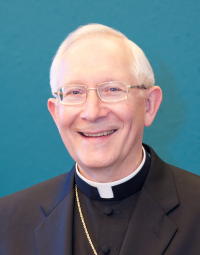
Archbishop Leonard P. Blair
Some weeks ago a piece in the Wall Street Journal told the story of two ordinary men who were life-long friends. The fact that a story like this should even get such attention in a prominent national newspaper is a commentary on our times. These days four in 10 Americans say they don’t even have a best friend at all. And as the article pointed out, “a lack of someone you can confide in can lead to loneliness and isolation, which have been labeled a public health threat.
A few days later another columnist in the New York Times described loneliness as an epidemic in our country. He reported that according to the Surgeon General, “loneliness is as deadly as smoking fifteen cigarettes a day, more lethal than consuming six alcoholic drinks a day, and more dangerous to health than obesity.” “We Americans,” he writes, “atomized and polarized, addicted and distressed, are a lonely crowd. Overwhelming evidence suggests that for the sake of our happiness and wellbeing, we need one another.” It is ironic that in a world that can put us in touch with anyone, anywhere, on a website or a mobile phone, we are in many ways less connected to one another, not more. We have fewer occasions to spend any real time with others. “Being with” someone is not the same as texting them. Watching a livestream of something is not the same thing as actually participating. Remaining glued to a cell phone or computer screen is not going to allow us to cross paths with people in a way that leads to an authentically personal human encounter. Remote presence is of value, but only a relative value.
In a recent conversation with one of our pastors he told me how these days he encounters many young couples in his parish who have very few, if any, real friendships. Their interest in the parish arises in part by a desire to get to know other people with whom they can relate. This presents the parish with a golden opportunity to welcome them, and to interest them not just in attending Mass, but also in getting involved with other parishioners at doing something that benefits both the parish and the wider community.
This priest also said something about his homilies that every parish priest should take to heart; namely, the importance of connecting the Gospel at Sunday Mass to parish life, whether it be charitable outreach and community engagement or personal spiritual enrichment and growth. This makes the connection between the Gospel and its practical application and shows pa-rishioners a way of engaging with one another in a shared effort outside of Mass, thus giving rise to friendships among them, especially young couples.
One Bible Dictionary tells us that in the Scriptures “friendship is a face-to-face encounter, signifying proximity, intimate revelation and honesty … a mutual improvement activity, honing one for godly use. It is also a bonding of affections and trust, knitting one’s very soul to another. In its ultimate reaches, it is union with God.” Friendship reaches its highest expression with Jesus himself. At the Last Supper he speaks these words to the Apostles and to us: “No one has greater love than this, to lay down one’s life for one’s friends. You are my friends if you do what I command you … I have called you friends because I have told you everything I have heard from my Father.” (Jn 15: 13-15)
And, as in all things, what Jesus has done, we too must do.
